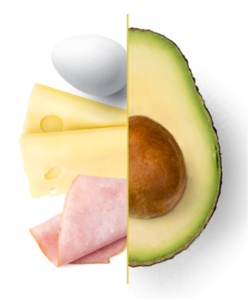Thanks to everyone who joined us at the LM2024 conference! Dr. Sabgir, alongside Lily Correa, MPH, RDN, DipACLM, presented Dietary Fats Decoded: Recommendations for Heart Health. Although dietary fat plays a critical role in cardiovascular health, there is a great deal of confusion around this nutrient and how it fits into a healthful eating pattern. Here’s a quick recap of the presentation including the evolution of dietary fat research, benefits of certain dietary fats, and tips for talking to your patients about this topic.
A New View on Dietary Fats: Consume unsaturated fats in place of saturated fats vs limiting total fat
Dietary guidelines have evolved from restricting all fats to encouraging unsaturated fats (like those in avocados, olive oil, and nuts) in place of saturated fats (found primarily in animal-based foods like butter, cheese, and meats) to support heart health.
Why Dietary Fat Matters
Associated with lower risk of cardiovascular disease: Prospective observational studies in many populations have shown that lower intake of saturated fat coupled with higher intake of unsaturated fats is associated with lower rates of cardiovascular disease (CVD) and all-cause mortality.[1],[2],[3] This approach of swapping saturated fat for unsaturated fat is considered most effecting in the context of an overall healthy, plant forward eating pattern.
Essential for the absorption of fat-soluble vitamins: Dietary fat can act as a nutrient booster by helping to increase the absorption of fat-soluble vitamins A, D, E and K. These vitamins are essential for overall health and some evidence points to vitamin A and D being linked to cardiovascular health.[4],[5]
Promotes satiety: Satiety is the physical feeling of fullness and dietary fat can promote this feeling. Feeling satiated after eating contributes to overall enjoyment and sustaining healthy eating behaviors as well as weight management.
Empower Patients with Simple Solutions
We know you face time constraints and patients are overwhelmed when discussing nutrition. Instead of focusing on what NOT to eat, focus on WHAT to add or include. Eating recommendations should be focused on whole food sources of unsaturated fats such as avocado, nuts, seeds, and seafood as they come with added nutrition benefits.
- A large prospective study published by Harvard researchers found that eating one or more avocados weekly was associated with reduced risk for cardiovascular diseases in a large prospective study. Researchers followed 110,487 participants for 30 years while collecting dietary intake with food frequency questionnaires every four years. The data models were adjusted for cardiovascular risk factors and diet quality. Replacing half a serving/day of margarine, butter, egg, yogurt, cheese, or processed meats with the equivalent amount of avocado was associated with a 16% to 22% lower risk of CVD.
- The study design does not show a direct cause and effect, and this research was limited to self-reported dietary collection and participants were mostly white nurses and healthcare professionals.

Keep things simple by suggesting small, actionable steps at each visit, such as:
- Try ONE new food this week
- Use olive oil instead of butter when sauteing
- Snack on a handful of nuts or seeds
- Blend avocado into your favorite smoothie
- Enjoy a bowl of oatmeal with soy milk, berries, chia seeds and walnuts
- Use mashed avocado as a spread on sandwiches
For any nutrition recommendations, work with your patient to discover what will work for them. Remember, small, sustainable changes like these can lead to big improvements over time.
Collaborate with Dietitians
Working with a dietitian can make a big difference. They provide specialized guidance, while physicians can reinforce these recommendations during check-ups, helping patients feel more supported and confident in their dietary changes.
For more tips or resources, feel free to reach out!
We’d like to say thank you to our partner, Avocados – Love One Today as we work together to inspire and support those in their journey to better heart health. Love One Today is a leading source of the healthiest reasons and tastiest ways to enjoy fresh avocado.
[1] Sacks FM, et al. Dietary Fats and Cardiovascular Disease: A Presidential Advisory From the American Heart Association. Circulation. 2017;136(3):e1-e23. doi:10.1161/CIR.0000000000000510
[2] Li Y, et al. Saturated Fats Compared With Unsaturated Fats and Sources of Carbohydrates in Relation to Risk of Coronary Heart Disease: A Prospective Cohort Study. J Am Coll Cardiol. 2015 Oct 6;66(14):1538-1548. doi: 10.1016/j.jacc.2015.07.055. PMID: 26429077; PMCID: PMC4593072.
[3] Mozaffarian D, et al. Effects on coronary heart disease of increasing polyunsaturated fat in place of saturated fat: a systematic review and meta-analysis of randomized controlled trials. PLoS Med. 2010 Mar 23;7(3):e1000252. doi: 10.1371/journal.pmed.1000252. PMID: 20351774; PMCI
[4] https://ods.od.nih.gov/factsheets/VitaminA-HealthProfessional/
[5] https://ods.od.nih.gov/factsheets/VitaminD-HealthProfessional/


